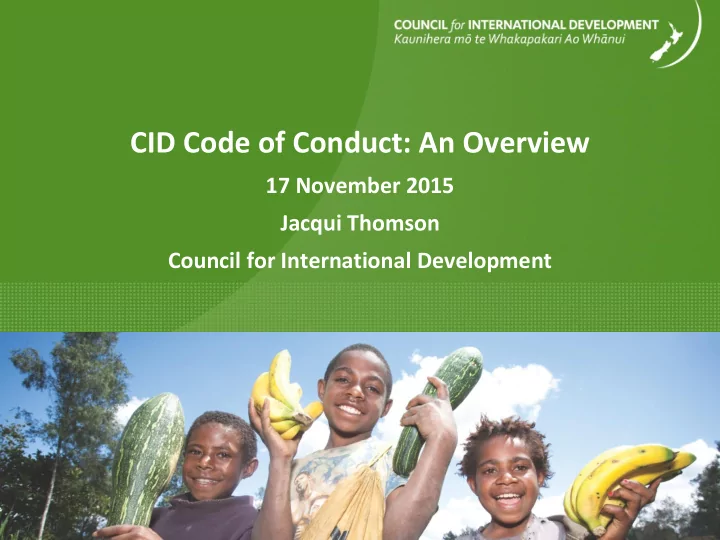

CID Code of Conduct: An Overview 17 November 2015 Jacqui Thomson Council for International Development
Pedram Pirnia Pedram Pirnia Photo: Dave Collyer, SurfAid Council for International Development (CID) • CID is an umbrella organisation for NZ based NGOs working in the international development sector • We work for our members providing information and liaison with MFAT • CID is also a member of PIANGO
Pedram Pirnia Pedram Pirnia Photo: Dave Collyer, SurfAid What is the CID Code of Conduct? • Sector Code of good practice • Voluntary • Based on the Australian ACFID Code of Conduct • Provide a blue print for operating transparently and in line with human right based approach
Pedram Pirnia Pedram Pirnia Goals of the Code • Improves development outcomes • Enhance public/stakeholder trust • Transparency and accountability • Better management of organisational risk • Organisational improvement • Sharing good practice
Photo: Bishnu Parajuli, ADRA
Pedram Pirnia Development of the Code • 2011: Initial Ideas • A discussion paper “ Towards a CID Code of Conduct ” was sent to all members • Code of Conduct Working Group established at the AGM • 2012-2013: Developments • CID strategic plan 2013-2017 included a goal to develop and implement a Code of Conduct • An internal discussion paper circulated recommending adapting the ACFID Code for the NZ context • Consultation with members • 2014: Adoption of the Code • Compliance Consultant hired to develop Code • Code of Conduct adopted unanimously at 2014 AGM
Pedram Pirnia What is in the Code? • 54 Principles: high level commitment to principles of programming, governance and public engagement • 150 Obligations: operationalise the principles – specific requirements for organisations • Some principles and obligations are mandatory and some can be progressively implemented overtime
Pedram Pirnia What is in the Code? • Section 1: Preamble • Outlines the values of the Code incl promoting transparency and accountability • Section 2: Programme Principles • Obligations on activities incl human rights, working with partners, gender equality, environmental sustainability, child protection • Section 3: Public Engagement • Obligations on marketing, fundraising, reporting
Pedram Pirnia What is in the Code? • Section 4: Organisation • Obligations on governance, management, finances, staff, complaints • Section 5: Compliance with the Code • Details what organisations need to do to be compliant with the Code of Conduct including the CID Complaints Handling Process
Photo: Aaron Martin, UNICEF Four Mandatory Principles • Non-development activity: Funds and other resources designated for the purpose of aid and development will be used only for those purposes and will not be used to promote a particular religious adherence or to support a political party.
Photo: Aaron Martin, UNICEF Four Mandatory Principles • Child protection: Signatory organisations are committed to the safety and best interests of all children accessing their services and programmes or involved in campaigns, voluntary support, fundraising, work experience or employment, and in particular, to working towards the elimination of abuse.
Photo: Aaron Martin, UNICEF Mandatory Principles • Control of funds and resources: Signatory organisations will make every reasonable effort to ensure that funds or resources disbursed to partners or third parties are applied lawfully, in accordance with the promise to the donor, for a proper purpose and with proper controls and risk management in place.
Photo: Aaron Martin, UNICEF Four Mandatory Principles • Emergency management (if undertaken): C ommit to providing humanitarian assistance in times of disaster, armed conflict, internal displacement and protracted crisis according to internationally agreed standards and principles of ethical practice.
Aaron Martin Why Mandatory Principles? • To ensure a minimal standard across areas considered particularly high risk • Enables a consistent approach to assessment of Code compliance
Aaron Martin Progressive Principles • Recognises that some areas of practice can take time to implement – for example gender equality and working with people with disabilities • Takes into account that CSOs are different sizes and have varied scopes of practice and values
Sam Dorey Photo: Alma Karsymbek, KNZRT . Code Governance • Code of Conduct Committee • Independent Chair, Special Expert, three member representatives • Oversees the work of the Code Coordinator • Have the power to grant or revoke Code Signatory Status • Code of Conduct Secretariat • Code of Conduct Coordinator
Photo: Sam Doorey, Banzaid What do Organisations have to do to comply with the Code? • Commit to the Code Principles • Under take a self-assessment every 2 years • Code Secretariat assesses each self-assessment and provides recommendations • Have a complaints handling process
Photo: Bishnu Parajuli, ADRA Compliance Self-Assessment (CSA) • Every 2 years • Completed by organisations and signed off by Board • This process includes: • An assessment of the organisation ’ s level of compliance • A narrative explaining how/why the organisations is compliant • Attach relevant policies/procedures
Photo: Bishnu Parajuli, ADRA Compliance Self-Assessment (CSA) • Code Committee (and Secretariat) provide recommendations to improve practice • Code Committee can grant or revoke Code Signatory Status
Photo:Paul Brown, ChildFund How this Code works for CID members • Provides a blue print for how to operate transparently, be accountable to stakeholders and to Human Rights Based Approach to programming • Identifies gaps in policies and processes • Can help NGOs become more effective
Paul Brown Photo: Rachel Hall, ChildFund NZ. Resources • The full Code of Conduct can be found online: http://www.cid.org.nz/assets/About/Important-Documents/Code-of- Conduct-FINAL-December-2014.pdf • The Implementation Reference Guide is also available : http://www.cid.org.nz/assets/Images/CID-specific-photos/Code-of- Conduct-and-Implementation-Reference-Guide.pdf • Discussion paper: http://www.cid.org.nz/assets/CID-Resources/Policy-position-and- discussion/Towards-a-Code-of-Conduct.pdf
Pedram Pirnia
Recommend
More recommend